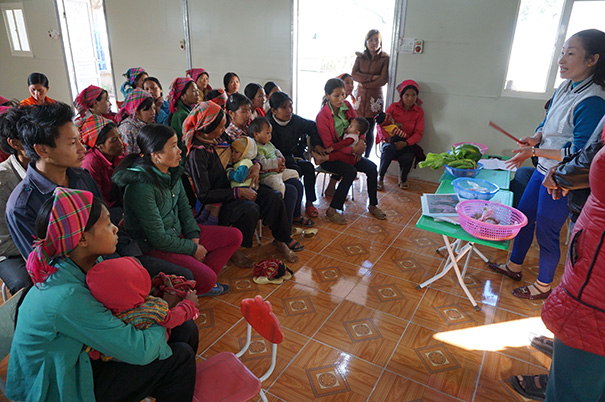Po Thi Thanh, 33, has been working at the Muong Te district health center in the rural north of her country of Vietnam for more than a decade. One of her priority tasks is to hold community awareness-raising events for women about breastfeeding and healthcare for pregnant women, especially in the remote villages of Vietnam’s La Hu ethnic minority community.
Recently, Thanh – who is of the Thai ethnic group, which is the majority group in Vietnam – said: “About 10 years ago, when I started working in Muong Te, I joined with other nurses to hold awareness-raising activities for La Hu villagers about breastfeeding. Then, La Hu women seemed very shy; mostly, they kept their distance and did not come to the meetings I hosted. In fact, I found I could only meet them after asking for help from Women Union’s cadres [who are recognized as government volunteers].
“When I was finally able to meet with the women I was eager to help. I was very surprised to learn, among other things, that La Hu women return to their routine hillside rice farming work just five days after they deliver their babies! I realized that La Hu newborns rarely have a chance to breastfeed because their mothers have to return to work in the fields far from home so soon after their births. I also learned that La Hu women have a number of misconceptions about the reasons for and value of nursing their newborns.”
Our team got to know Thanh through a partnership between CWS and Muong Te’s district health center. CWS team members joined community health workers like Thanh in Muong Te’s district health center to more regularly promote good healthcare for pregnant women, to advocate for proper breastfeeding and to help families, especially moms, learn how to prevent child malnutrition.
After many years of dedicated work, Thanh and her colleagues are very glad to see significant improvements in La Hu communities. Now, La Hu women are far less shy and they voluntarily come to CWS-hosted community events; community workers do not have to persuade them. Sometimes there are even 35-40 people at a meeting. And, La Hu women now know to inform health workers of their pregnancies and to have maternity health check regularly.
Also important is the fact that La Hu men now know to prioritize nutritious food like fish, pork, eggs, vegetables and beans for their pregnant wives. They are also now more likely to call for a health worker’s help when their wives go into labor — even though they still want to deliver their babies at home to prevent a male doctor from seeing their wives’ bodies.
La Hu ethnic women still return to their farming work just about two weeks after delivery. Although it is still too early and not good for their health, mothers do now bring their babies and their own moms for extra help, to huts by their hillside rice fields for breastfeeding and nurturing.
Health workers still advocate with La Hu women for more optimal breastfeeding at home for at least four months after a baby’s birth. And, though they know they still have a long way to go, women like Thanh are pleased and proud of the La Hu, and other ethnic communities, for their progress.

